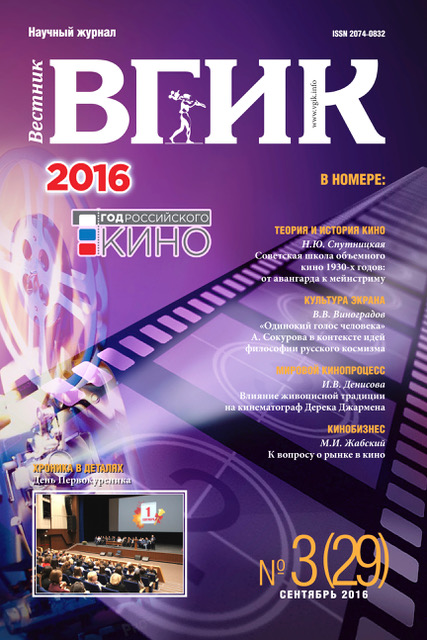A. Sokurov’s “The Lonely Voice of Man” in the Context of Russian Cosmism
- Authors: Vinogradov V.V1
-
Affiliations:
- ВГИК
- Issue: Vol 8, No 3 (2016)
- Pages: 58-71
- Section: SCREEN CULTURE | CULTURAL STUDIES. PHILOSOPHY
- URL: https://journals.eco-vector.com/2074-0832/article/view/14712
- DOI: https://doi.org/10.17816/VGIK8358-71
- ID: 14712
Cite item
Full Text
Abstract
The article is devoted to the first collaborative work of the director Alexander Sokurov and the scripwriter Yury Arabov The Lonely Voice of Man, based on A. Platonov’s works. The everlasting value of the picture is expressed through a number of concepts and images, identified by the author, which will later become his central ideas and further develop in Sokurov's films. The author analyses the imagery system of the film, its major concepts in the context of artistic-philosophical system of Platonov and N. Fyodorov's “philosophy of the common task”, addresses the main and essential biblical allusions implicated in the film. First and foremost, the main character Nikita Firsov is associated with the images of the prodigal son and Jesus Christ: love without any body contact, break with the father (earthly), Nikita's departure which reminds of Christ's withdrawal to the desert, return of Nikita associated with the arrival of Christ in Galilee, unique resurrection from the dead, etc. The research is based upon the concept of “substance of existence” - the central idea of philosophy of Russian cosmism and Platonov's artistic-philosophical system (greatly influenced by the ideas of N.Fyodorov). In the context of A. Sokurov's creative work the author pinpoints the issue of the filial love, as a necessary condition to achieve unity and harmony that became the basis for philosophical explorations of N. Fyodorov and philosophical-imagery system of A. Platonov. The author also juxtaposes A.Sokurov and A.Tarkovsky in their ways of depicting historical (narrative) time. A.Tarkovsky defines this category via motive of unity of a person with the world resulting in disappearance of the notion of the past (in accordance with the Fyodorov's vector of mankind’s movement). A. Sokurov like A. Platonov expresses this historicism through entropy. For A. Tarkovsky it is a cutoff, eternity and homogeneity (an absolute substance of life), for A. Sokurov (as well as for A. Platonov) it is a movement and versatility.
About the authors
Vladimir V Vinogradov
ВГИК
Author for correspondence.
Email: editor@vestnik-vgik.com
PhD in Art, Ass. Professor, Department of Cinema Studies, VGIK.
References
- Платонов А. Река Потудань. Избранное. - М.: «Гудьял-Пресс», 1999. - 592 c.
- Платонов А. Песчаная учительница // А. Платонов. Избранные произведения: Рассказы. Повести. - М.: Мысль, 1983. - 653 c.
- Платонов А. Чевенгур. Роман и повести // сост. М.А. Платонова [Послесл. и коммент. В.А. Чалмаева]. - М.: Советский писатель, 1989. - 654 с.
- Платонов А. Борьба с пустыней. Звуки, звезды.. //Воронежская коммуна, 1924, 14 декабря, № 286.
- Платонов А.П. Сокровенный человек (Рассказы. Повести). - Кишинев: Литература Артистикэ, 1981. - 640 с.
- Платонов А.П. Мусорный ветер // А.П. Платонов. Повести, рассказы. Из писем. - Воронеж, 1982. - 453 с.
- Платонов А. Ювенильное море. Повести. Рассказы. Публицистика. Пьеса. - Воронеж: Центр. -Чернозем. кн. изд-во, 1988. - 501 с.
- Федоров Н.Ф. Собрание сочинений: в 4-х т.: Т. I. - М.: Издательская группа «Прогресс», 1995. - 518 с.
- Шубин JI. Поиски смысла отдельного и общего существования. - М.: Сов. писатель, 1987. -173 с.
- Вопрос о братстве, или родстве, о причинах небратского, неродственного, т. е. немирного, состояния мира и о средствах к восстановлению родства. Записка от неученых к ученым, духовным и светским, к верующим и неверующим» // Н.Ф. Федоров. Собрание сочинений: в 4-х т. Том I. М.: Издательская группа «Прогресс», 1995. С. 64.
- Андрей Платонов. Река Потудань. Избранное. М., 1999.
- Платонов А.П. Чевенгур. СПб., 2008
- Федоров Н.Ф. Собрание сочинений в 4-х т. Том I. М.: Издательская группа «Прогресс», 1995. С. 572
Supplementary files








